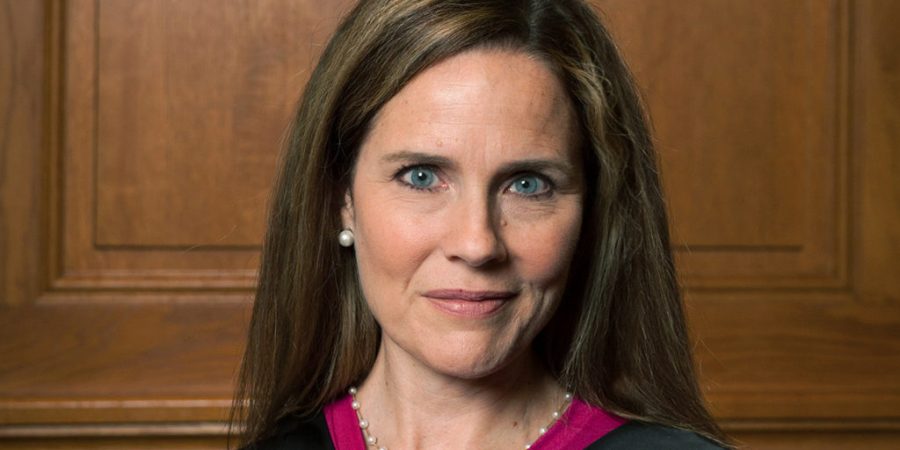For the historically minded, it is striking how much anti-Catholicism in American politics has changed since it arose in the 1840s.
Opinion: Playing the anti-Catholic card in the Barrett nomination

Their Constitution thus differentiated the new republic from England, which then required public officials to take a “test oath” rejecting transubstantiation, thereby effectively barring Roman Catholics. While the constitutional provision merely prohibits formal religious qualifications, it has cast a wide and worthy penumbra. To openly oppose candidates or nominees because of their religion is to invite the charge of unAmericanism.
So it was that even before President Trump announced his nomination of Amy Coney Barrett to the Supreme Court, her supporters were preemptively leveling this charge against her opponents.
“The anti-Catholic attacks against SCOTUS frontrunner Judge Amy Coney Barrett, a former Notre Dame law professor, are already flowing,” declared a CBN news analysis last Tuesday, though it didn’t actually cite any attack more recent than Sen. Dianne Feinstein’s notorious remark that “the dogma lives loudly within you” at Barrett’s confirmation hearing to became a federal appeals court judge in 2017.
There really is no need for the Democrats to go there, since it is sufficient for them to oppose her nomination on timing grounds — the let-the-people-have-a voice-before-a-presidential election ones laid down by Mitch McConnell when he blocked President Obama’s nomination of Merrick Garland early in 2016. But this time there will be actual hearings and, therefore, some temptation to demonstrate to the public that, in choosing Barrett, Trump has picked a nominee who will overturn Roe v. Wade on religious grounds.
My guess is that, however they choose to highlight Barrett’s anti-abortion convictions and her readiness to overturn precedent, the Democratic senators will make clear that they are not criticizing her for being a Catholic. Their bona fides in that regard are easily enough demonstrated: Joe Biden is the fourth Catholic their party has chosen to be its standard-bearer even as the GOP has chosen none.
For the historically minded, it is striking how much anti-Catholicism in American politics has changed since it arose in the 1840s. Through the election of John F. Kennedy in 1960, it was all about Protestants against Catholics, with the central charge being that Catholics were in thrall to a foreign potentate, the pope, who opposed the values of democracy and religious liberty on which the United States was founded.
Now both Protestants and Catholics live in divided houses. White evangelical Protestants join conservative Catholics in taking the official Catholic position on abortion even as most mainline Protestants and a majority of Catholics reject it. Religious liberty, increasingly understood as being exempt from anti-discrimination laws, is now as fervently embraced by conservative Catholics as by white evangelicals.
And as for the pope, the strongest criticism these days comes not from Protestants but from the Catholic right.
Last Tuesday, at a webinar cosponsored by the center I direct, National Catholic Reporter Editor Heidi Schlumpf noted that Pope Francis had pronounced the death penalty inadmissible in all cases. Whereupon John Sununu, former New Hampshire governor and White House chief of staff, cracked, “So a lot of people are holding their hands over their ears until the Argentinian socialist has gone.”
A number of attendees took offense at that, so since I was handling the questions, I gave Sununu a chance to take it back. He didn’t.
“I really do feel that the pope has brought a perspective that is anti-capitalism,” he said. “A perspective that, that is pro-socialism, a perspective that has been soft on our culture issues, a perspective that, that is in love with woke and, and I feel as, as a Catholic who cares about my religion that, that he is doing things… that I think undermines what Catholicism was the day before he became pope. And I don’t think he’s entitled, and in this period of time to change the tenets of Catholicism, the way he’s trying to do it.”
Meanwhile, last Wednesday the right-wing National Catholic Prayer Breakfast gave its “Christ’s Faithful Laity” award to Attorney General William Barr, despite his recent reinstatement of the federal death penalty after 17 years. To paraphrase St. Augustine, “Roma locuta, causa ignorata”— Rome has spoken, so what?
Back in 1998, Amy Coney Barrett co-authored an article for the Marquette Law Review that argued that Catholic judges ought to recuse themselves from death penalty cases. It would be interesting if one of the senators asks her if she still believes that and what she thinks of Barr’s decision.
Somewhere, the anti-Catholic Protestants of the American past are scratching their heads.
Read more news at XPian News… https://xpian.news



Comments are Closed